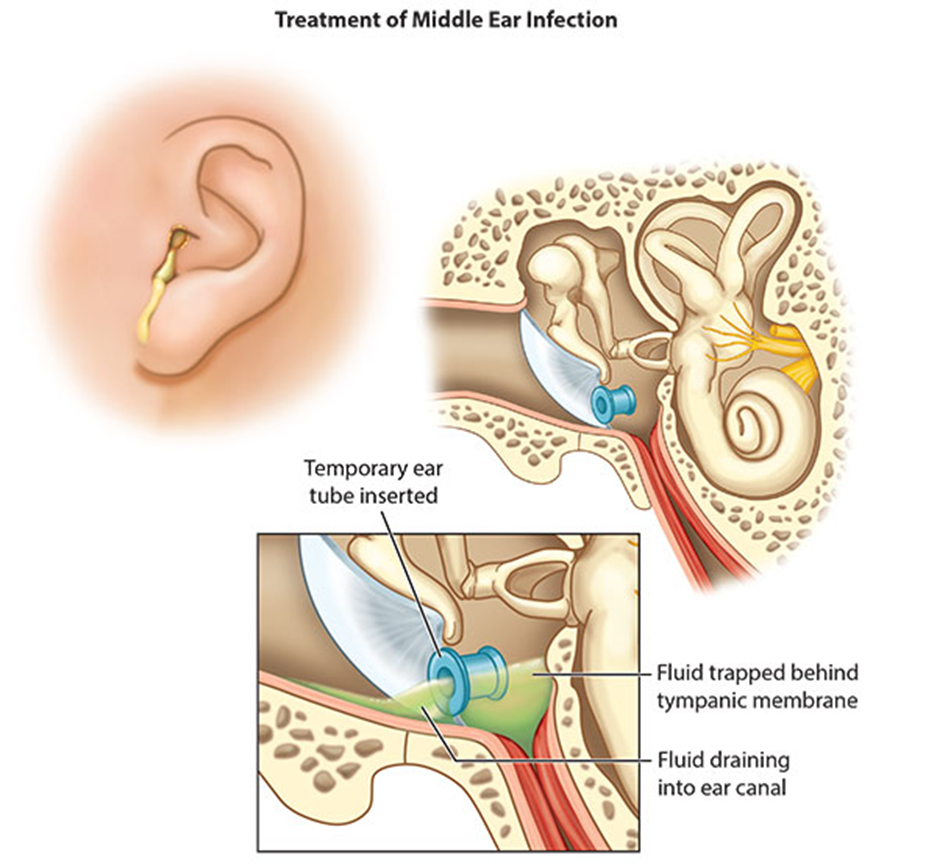A nurse working on an outpatient surgical unit is providing discharge teaching to the parent of a preschooler following placement of tympanoplasty tubes. The parent asks the nurse, "What should I do if the tubes fall out?" Which of the following responses should the nurse make?
"Gently put the tubes back into the child's ears."
"Bring the child to the emergency department immediately."
"Notify the provider that the tubes have fallen out."
"The tubes are sutured in place and must be surgically removed."
The Correct Answer is C
A. "Gently put the tubes back into the child's ears": This is not the correct response. Tympanoplasty tubes are not meant to be reinserted if they fall out. Attempting to reinsert them without proper medical training could cause injury or damage to the child's ears. Therefore, this response should be avoided.
B. "Bring the child to the emergency department immediately": While it's important for the parent to seek medical attention if the tubes fall out, it may not always necessitate a visit to the emergency department, especially if the child is not experiencing any other symptoms. This response might cause unnecessary panic for the parent and may not be the most appropriate course of action.
C. "Notify the provider that the tubes have fallen out": This is the correct response. If the tympanoplasty tubes fall out, the parent should notify the healthcare provider who performed the procedure. The provider can then assess the situation and determine the next steps, which may include scheduling a follow-up appointment to evaluate the child's ears.
D. "The tubes are sutured in place and must be surgically removed": This is incorrect. Tympanoplasty tubes are not sutured in place; they are typically designed to fall out on their own after a certain period of time. Additionally, removal of tympanoplasty tubes usually does not require another surgical procedure.

Nursing Test Bank
Naxlex Comprehensive Predictor Exams
Related Questions
Correct Answer is B
Explanation
A. Give the infant liquids using a small spoon with a long handle.
Give the infant liquids using a small spoon with a long handle.While feeding is essential, the method described is not specific to postoperative care after cleft palate repair.Feedings are resumed by bottle, breast/chest, or cup per surgeon preference; some surgeons prescribe the use of an Asepto syringe for feeding or a soft cup such as a soft-tipped sippy cup.
B. Apply elbow restraints to the infant.
Apply elbow restraints to the infant is correct.Elbow restraints would be used to prevent the infant from injuring or traumatizing the surgical site.
C. Gently check the infant's suture line using a padded tongue depressor.
It's important to assess the surgical site for signs of infection or bleeding, but using a padded tongue depressor may not be the most appropriate method. The nurse should follow the surgeon's orders regarding wound care and assessment techniques, which may include visual inspection without manipulation.
D. Place the infant in a supine position.
Placing the infant in a supine position is generally recommended after cleft palate repair surgery to minimize strain on the surgical site and promote healing. However, it's essential to ensure proper positioning to prevent aspiration and maintain airway patency.
Correct Answer is D
Explanation
A. "You should give your child aspirin if they report pain at the site."
This statement is incorrect. Aspirin is a blood-thinning medication that can increase the risk of bleeding, which is particularly concerning after a cardiac catheterization procedure. It is not recommended to administer aspirin unless specifically instructed by the healthcare provider.
B. "You can remove the pressure dressing 8 hours after the procedure."
This statement is incorrect. The pressure dressing applied after a cardiac catheterization procedure is typically left in place for a specific period of time, as determined by the healthcare provider. The dressing helps prevent bleeding at the insertion site. It is essential to follow the healthcare provider's instructions regarding the timing of dressing removal.
C. "Your child can soak in the bathtub 24 hours after the procedure."
This statement is incorrect. Immersing the insertion site in water, such as soaking in a bathtub, should be avoided for a certain period after a cardiac catheterization procedure to reduce the risk of infection. The healthcare provider will provide specific instructions on when it is safe for the child to bathe or shower.
D. "Your child should avoid strenuous physical activities for several days."
This statement is correct. After a cardiac catheterization procedure, it is typically recommended to avoid strenuous physical activities for a specified period to allow the insertion site to heal properly and reduce the risk of complications such as bleeding or hematoma formation.
Whether you are a student looking to ace your exams or a practicing nurse seeking to enhance your expertise , our nursing education contents will empower you with the confidence and competence to make a difference in the lives of patients and become a respected leader in the healthcare field.
Visit Naxlex, invest in your future and unlock endless possibilities with our unparalleled nursing education contents today
Report Wrong Answer on the Current Question
Do you disagree with the answer? If yes, what is your expected answer? Explain.
Kindly be descriptive with the issue you are facing.
